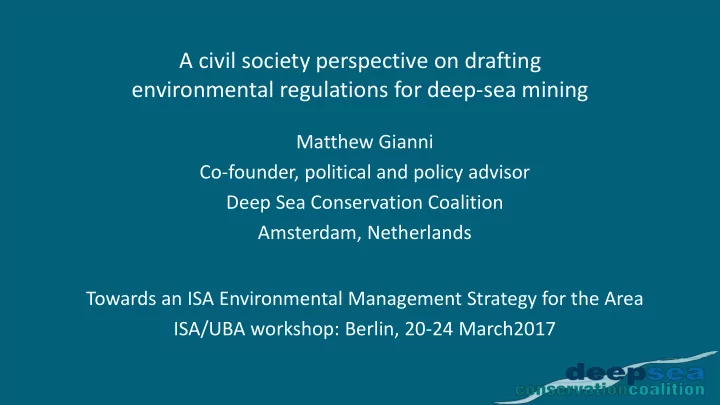

A civil society perspective on drafting environmental regulations for deep-sea mining Matthew Gianni Co-founder, political and policy advisor Deep Sea Conservation Coalition Amsterdam, Netherlands Towards an ISA Environmental Management Strategy for the Area ISA/UBA workshop: Berlin, 20-24 March2017
Deep Sea Conservation Coalition Position Statement • The priority approach to the consumption of mineral resources should be one of sustainability, reuse, improved product design and recycling of materials rather than exploring for new sources of minerals, including in the deep-sea. (longstanding position of many organisations, sustainable consumption SDG 12, not only DSM) If deep-sea mining is permitted to occur: • full range of marine habitats, biodiversity and ecosystem functions are adequately and effectively protected - MPAs/APEIs, SEMPs, baseline information, precautionary approach, polluter pay, transparency, Liability Fund, Sustainability Fund, etc (DSCC Submissions to ISA)
Metal demands for renewable energy • Transition to 100% renewable energy economy by 2050 can be done without sourcing supplies from deep-sea • Copper Cobalt • Nickel Lithium • Silver • Specialty metals (Tellurium) • Rare Earths (Neodymium, Dysprosium) Teske, S., Florin, N., Dominish, E. & Giurco, D. 2016, Renewable Energy and Deep Sea Mining: Supply, Demand and Scenarios. University of Technology Sydney https://opus.lib.uts.edu.au/handle/10453/67336
DSCC/NGO Concerns Biodiversity, uncertainties, difficult to monitor impacts and activities, long-term potentially irreversible impacts, recovery uncertain or not likely over reasonable times scales. Are political, institutional and financial structures in place to ensure effective monitoring and compliance Transparency – ISA must become much more transparent. Discussion paper on eregs, Article 154 Review report and Committee report
A lot is at stake: Global Marine Assessment/World Ocean Assessment Chapter 36F - Open Ocean Deep Sea • “This truly vast deep -sea realm constitutes the largest source of species and ecosystem diversity on Earth” • “There is strong evidence that the richness and diversity of organisms in the deep sea exceeds all other known biomes… and supports the diverse ecosystem processes and functions necessary for the Earth’s natural systems to function” • “Deep -sea ecosystems are crucial for global functioning; e.g., remineralization of organic matter in the deep sea regenerates nutrients that help fuel the oceanic primary production that accounts for about half of atmospheric oxygen production.”
Sustainable Development Goal 14.2 “By 2020, sustainably manage and protect marine and coastal ecosystems to avoid significant adverse impacts, including by strengthening their resilience, and take action for their restoration in order to achieve healthy and productive oceans” Comments from NGO colleagues Thank-you! Deep Sea Conservation Coalition www.savethehighseas.org
Recommend
More recommend